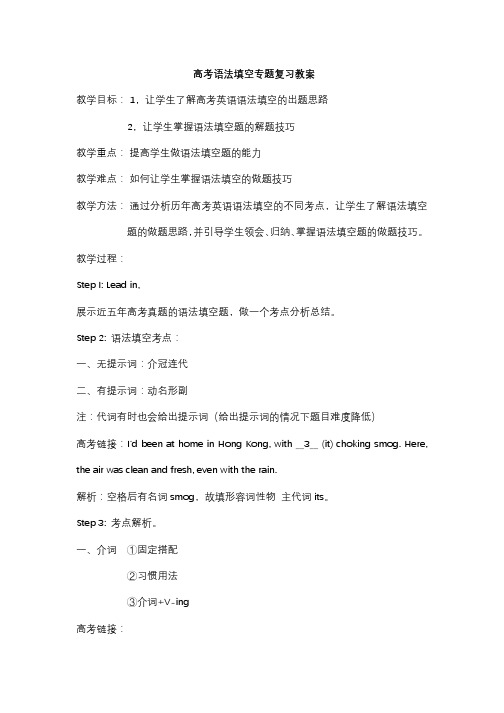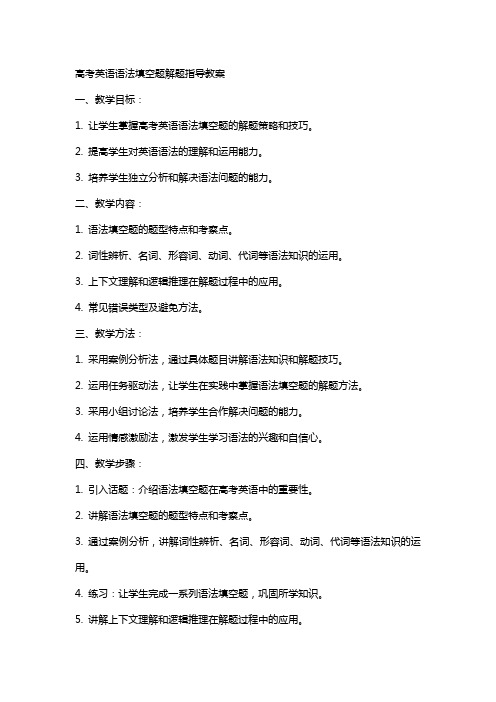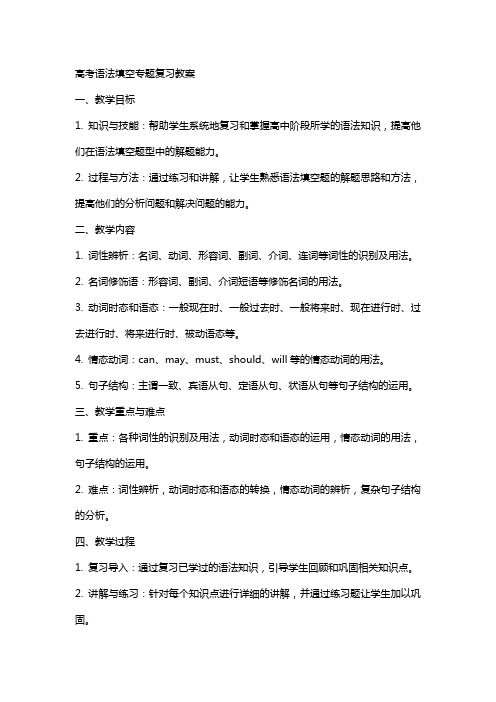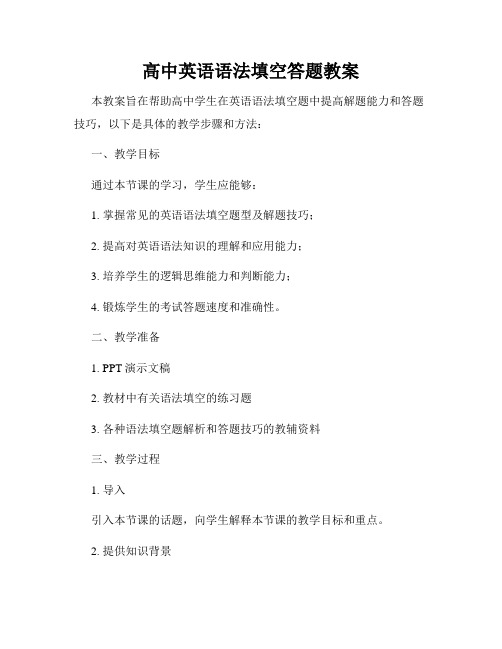高考语法填空教学设计
高考语法填空专题复习教案

高考语法填空专题复习教案教学目标: 1,让学生了解高考英语语法填空的出题思路2,让学生掌握语法填空题的解题技巧教学重点:提高学生做语法填空题的能力教学难点:如何让学生掌握语法填空的做题技巧教学方法:通过分析历年高考英语语法填空的不同考点,让学生了解语法填空题的做题思路,并引导学生领会、归纳、掌握语法填空题的做题技巧。
教学过程:Step I: Lead in,展示近五年高考真题的语法填空题,做一个考点分析总结。
Step 2: 语法填空考点:一、无提示词:介冠连代二、有提示词:动名形副注:代词有时也会给出提示词(给出提示词的情况下题目难度降低)高考链接:I'd been at home in Hong Kong, with __3__ (it) choking smog. Here, the air was clean and fresh, even with the rain.解析:空格后有名词smog,故填形容词性物主代词its。
Step 3: 考点解析。
一、介词①固定搭配②习惯用法③介词+V-ing高考链接:I‘d headed straight for Yangshuo. For those who fly to Guilin, it's only an hour away __6__ car and offers all the scenery of the better-known city.解析:固定搭配by+交通工具二、冠词①a/an泛指,常用于第一次出现的单数名词前和固定搭配中。
②the特指,习惯用法, 固定搭配。
高考链接:The adobe dwellings(土坯房)built by the Pueblo Indians of the American Southwest are admired by even __2__ most moder n of architects and engineers. 解析:the+最高级三、连词1并列连词:如and,but,or等2从属连词:引导名词性从句that,what,whether等;3状语从句的连词:because,when,since等高考链接:Instead, you can find some sources from the Internet __3__ print the copies needed. Remember, however, that you should usually consult different types of sources.解析:连接并列谓语find和print,故填and。
高考英语语法填空题解题指导教案

高考英语语法填空题解题指导教案一、教学目标:1. 让学生掌握高考英语语法填空题的解题策略和技巧。
2. 提高学生对英语语法的理解和运用能力。
3. 培养学生独立分析和解决语法问题的能力。
二、教学内容:1. 语法填空题的题型特点和考察点。
2. 词性辨析、名词、形容词、动词、代词等语法知识的运用。
3. 上下文理解和逻辑推理在解题过程中的应用。
4. 常见错误类型及避免方法。
三、教学方法:1. 采用案例分析法,通过具体题目讲解语法知识和解题技巧。
2. 运用任务驱动法,让学生在实践中掌握语法填空题的解题方法。
3. 采用小组讨论法,培养学生合作解决问题的能力。
4. 运用情感激励法,激发学生学习语法的兴趣和自信心。
四、教学步骤:1. 引入话题:介绍语法填空题在高考英语中的重要性。
2. 讲解语法填空题的题型特点和考察点。
3. 通过案例分析,讲解词性辨析、名词、形容词、动词、代词等语法知识的运用。
4. 练习:让学生完成一系列语法填空题,巩固所学知识。
5. 讲解上下文理解和逻辑推理在解题过程中的应用。
6. 分析常见错误类型及避免方法。
7. 总结本节课的主要内容和解题技巧。
五、课后作业:1. 复习本节课所学的语法知识和解题技巧。
2. 完成课后练习,加深对语法填空题的理解和应用。
3. 准备下一节课的学习内容。
教学评价:1. 课后收集学生的练习成果,评估学生对语法知识的掌握程度。
2. 在下一节课开始时,进行课堂测验,检验学生对所学内容的消化和吸收。
3. 关注学生在课堂上的参与度和合作程度,了解学生的学习状态。
4. 定期与学生交流,了解他们的学习需求和困惑,调整教学方法和策略。
六、教学内容:1. 介词、连词和冠词的用法。
2. 时态和语态的运用。
3. 句子结构的分析和调整。
4. 完形填空题的解题策略。
七、教学方法:1. 采用互动式教学法,让学生在课堂上积极参与讨论和练习。
2. 使用多媒体教学资源,展示例题和解析。
3. 运用比较法,分析不同语法结构的差异。
《高中英语语法填空》教学设计

《高中英语语法填空》教学设计《高中英语语法填空》教学设计一、主题与目标本课程设计的主题是高中英语语法填空。
我们将通过讲解、演示和实践等方法,帮助学生掌握语法填空的基本技巧,提高他们在这一题型上的得分率。
二、教学内容我们将根据高考英语语法填空题型的特点,针对性地讲解以下知识点和技能:1、动词时态和语态2、主谓一致3、名词性从句4、定语从句5、状语从句6、强调句型7、倒装句8、虚拟语气三、教学方法我们将运用案例教学法、练习+讲解法和互动讨论法等多种方法,以激发学生的学习兴趣和主动性。
四、课堂实施1、第一阶段:导入新课。
通过展示一些语法填空的典型例题,引导学生思考解题的思路和方法。
2、第二阶段:知识点和技能讲解。
结合具体的例题,详细讲解上述八大语法知识点和技能,让学生深入理解语法填空的基本技巧。
3、第三阶段:实践练习。
设计一系列语法填空的练习题,让学生在实践中掌握所学知识和技能。
4、第四阶段:讨论与总结。
学生完成练习后,组织小组讨论,引导学生发现问题和不足,并及时给予指导。
最后,对本次课程进行总结,强调重点知识和技能。
五、教学评价我们将采用以下方式对学生的学习成果进行评估:1、课堂参与度:观察学生在课堂中的表现,如回答问题、参与讨论等,作为评价学生学习态度和参与度的依据。
2、练习完成情况:检查学生完成语法填空练习题的正确率,以此评估学生对所学知识和技能的掌握程度。
3、期末考试:通过期末考试的语法填空部分,检验学生在整个学期的学习成果。
六、反思与改进在课程结束后,我们将根据学生的反馈和评价结果,对本次课程进行反思和总结。
我们将关注学生的学习难点和需求,反思教学方法的有效性,并根据总结的结果对未来的教学进行改进。
为了提高教学效果,我们建议在每个教学阶段之后都进行及时的反馈和评估,以便及时发现并解决问题。
在课程设计过程中,也要充分考虑学生的实际需求和学习特点,以制定出更符合学生情况的教学计划。
总的来说,《高中英语语法填空》教学设计旨在帮助学生掌握英语语法填空的基本技巧,提高他们的解题能力。
高考语法填空专题复习教案

高考语法填空专题复习教案一、教学目标1. 知识与技能:帮助学生系统地复习和掌握高中阶段所学的语法知识,提高他们在语法填空题型中的解题能力。
2. 过程与方法:通过练习和讲解,让学生熟悉语法填空题的解题思路和方法,提高他们的分析问题和解决问题的能力。
二、教学内容1. 词性辨析:名词、动词、形容词、副词、介词、连词等词性的识别及用法。
2. 名词修饰语:形容词、副词、介词短语等修饰名词的用法。
3. 动词时态和语态:一般现在时、一般过去时、一般将来时、现在进行时、过去进行时、将来进行时、被动语态等。
4. 情态动词:can、may、must、should、will等的情态动词的用法。
5. 句子结构:主谓一致、宾语从句、定语从句、状语从句等句子结构的运用。
三、教学重点与难点1. 重点:各种词性的识别及用法,动词时态和语态的运用,情态动词的用法,句子结构的运用。
2. 难点:词性辨析,动词时态和语态的转换,情态动词的辨析,复杂句子结构的分析。
四、教学过程1. 复习导入:通过复习已学过的语法知识,引导学生回顾和巩固相关知识点。
2. 讲解与练习:针对每个知识点进行详细的讲解,并通过练习题让学生加以巩固。
3. 分析与讨论:让学生分组讨论,分析练习题中的错误和困惑,互相交流解题心得。
五、教学评价1. 课堂参与度:观察学生在课堂上的积极参与程度,提问和回答问题的积极性。
2. 练习完成情况:检查学生完成练习的情况,对错误的题目进行分析和讲解。
3. 学习效果:通过课后作业和小测验等方式,评估学生对所学知识的掌握程度。
教学资源:练习题库、教案参考书、多媒体教学设备等。
六、教学方法1. 案例分析:通过分析典型的语法填空题目,让学生了解题目要求和考查的重点。
2. 互动教学:采用问答、讨论等形式,激发学生的思考,提高他们的学习兴趣。
3. 练习巩固:通过大量练习,让学生在实践中掌握语法知识,提高解题能力。
4. 反馈评价:及时给予学生反馈,指出错误和不足,帮助他们纠正并提高。
高中英语语法填空答题教案

高中英语语法填空答题教案本教案旨在帮助高中学生在英语语法填空题中提高解题能力和答题技巧,以下是具体的教学步骤和方法:一、教学目标通过本节课的学习,学生应能够:1. 掌握常见的英语语法填空题型及解题技巧;2. 提高对英语语法知识的理解和应用能力;3. 培养学生的逻辑思维能力和判断能力;4. 锻炼学生的考试答题速度和准确性。
二、教学准备1. PPT演示文稿2. 教材中有关语法填空的练习题3. 各种语法填空题解析和答题技巧的教辅资料三、教学过程1. 导入引入本节课的话题,向学生解释本节课的教学目标和重点。
2. 提供知识背景通过PPT展示一些常见的语法填空题型,例如:动词时态、形容词和副词的比较级和最高级、介词、连词等。
3. 学生合作讨论将学生分成小组,让他们共同讨论和解答几道语法填空题。
鼓励学生提出解题思路和答案,并在每道题讨论结束后进行答案讲解。
4. 答题技巧讲解讲解一些常见的语法填空题解题技巧,例如:根据上下文语境确定适当的语法形式、注意主谓一致性、词汇搭配等。
5. 边讲解边练习在PPT上出示一道语法填空题,让学生边讲解边思考,然后在规定时间内给出答案。
逐步增加难度,让学生逐渐熟悉各种语法填空题的解题思路和答题技巧。
6. 小结和反馈总结本节课的重点内容,再次强调解题技巧和注意事项。
鼓励学生在以后的学习中多做语法填空题,提升自己的解题能力和准确性。
四、教学延伸为了帮助学生更好地掌握语法知识和解题技巧,建议学生做更多的语法填空训练题。
可以参考各种教辅资料中的习题,或者使用在线学习平台上的相关资源。
五、课堂小结通过本节课的学习,学生对英语语法填空题的解题技巧和答题方法有了更深入的了解和掌握。
希望学生能够在以后的学习中加强对语法知识的学习和应用,提高自己的语言能力和解题能力。
高考语法填空专项教案

高考语法填空专项教案教案标题:高考语法填空专项教案教案目标:1. 学生能够理解高考语法填空题的题型特点和解题技巧。
2. 学生能够掌握常见的语法知识点,包括动词时态、语态、非谓语动词、代词、连词等。
3. 学生能够在语法填空题中准确运用所学的语法知识,提高答题准确率。
教学准备:1. 教师准备多个高考语法填空题,涵盖不同的语法知识点。
2. 准备多媒体设备,以便展示教学材料和示范答案。
3. 准备学生练习题册,以便学生进行练习和巩固。
教学步骤:引入:1. 展示一道高考语法填空题,简要介绍语法填空题的题型特点和解题策略。
2. 引导学生思考如何在填空题中选择正确的语法形式。
讲解语法知识点:1. 选择一个常见的语法知识点,如动词时态。
通过例句和解释,讲解动词时态的用法和判断方法。
2. 展示一道高考语法填空题,要求学生根据所学的动词时态知识进行填空,并解释答案的选择原因。
练习与巩固:1. 学生进行个人或小组练习,完成多道高考语法填空题。
2. 学生互相交流答案,并与教师进行讨论和解答疑惑。
拓展与应用:1. 教师提供更多的高考语法填空题,要求学生在限定时间内完成。
2. 学生进行模拟考试,检验所学的语法知识在实际应用中的掌握情况。
总结与评价:1. 教师对学生的练习情况进行总结和评价,指出学生在语法填空中的优点和不足。
2. 鼓励学生继续巩固和提高语法知识,为高考做好准备。
教学延伸:1. 学生可以自主查找高考语法填空题进行练习,加深对语法知识的理解和应用。
2. 学生可以针对自己在语法填空中的薄弱点进行有针对性的练习和学习。
教学反思:1. 教师对本节课的教学进行反思,总结教学过程中的不足和改进的方向。
2. 教师根据学生的反馈和表现,调整下一次教学的内容和方法。
备注:本教案仅为示例,具体教学内容和步骤可根据实际情况进行调整和修改。
高三英语语法填空动词教学设计

教学设计课题:Verb Transformation in Blank Filling课型:复习课主要教学内容和教学对象:主要内容是verb transformation in blank filling;教学对象为高三学生,基础较薄弱,已经学过语法填空动词专题,但不能系统掌握,失分严重。
Learning objectives:1. Students will develop a comprehensive understanding of verb transformation language points in blank filling exercises through collaborative mind mapping.2. Students will apply the acquired knowledge and tips by independently designing verb-related blanks.Key point: Creating a mind map for verb transformation in blank filling exercises.Difficult point: Applying the mind map for verb transformation through blank design. Teaching procedures:Lead-in高考真题中的语法填空题导入:students were asked to complete some blanks.Part 1 Group Discussion and Mind Map CreationStudents are divided into six groups to discuss and finish the following tasks. The teacher will invite two students to draw their mind maps on the blackboard and after discussion , they try to describe their ideas to the whole class.1.According to the blanks they have completed,uncover how the verbs can be transformed.2.draw a simple mind map (list one example for each point)The purpose:Part 2 tipsBefore students do their designing work, they should know some tips:1.no more than 5 blanks2.suitable verbs based on vocabulary3.focus on long sentences as much as possible4.involve different language pointsthe purpose: to help students design verb-related blanks quicklyPart 3 Design verb-related blanks1.show how to design blanks on the screen and two handouts about two topics in thispart2.Then it’s time for students to become designers. Students in row 1,3,5 will finishhandout 1 about Loong and students in row 2,4,6 will complete handout 2 about Acupuncture.Handout 1 LoongOver the 5,000 years of Chinese history, the Chinese dragon used to be a totem(图腾). Gradually, it has evolved into a Chinese icon representing the spirit of the Chinese nation. Legend goes that the Chinese dragon can fly and has the magical power to control wind and rain, so can spurt water from its mouth to provide timely rainfall to ensure a good harvest.Across the vast land of China, ordinary people worshiped the dragon, whose images and names can be found in architectural structures or decorations. As the dragon always has an auspicious(吉祥的) meaning, Chinese culture is also called the “Culture of the dragon.”When the Chinese name newborn babies, long, the pronunciation of Chinese dragon in Mandarin(普通话), is a frequently selected character, especially for boys born in the Year of the Dragon, as it is hoped that they will grow as strong and energetic as a dragon.In recent years, some Chinese have tried to translate long into Loong, a pun (双关语) that is similar to the English word “long” and the Chinese word long. No matter which way long is translated, it is worth noting that the Chinese dragon is a positive, dignified, auspicious, warm and joyful image, much different from that of the Western dragon. As the Year of the Dragon is coming, it is necessary to give a clear interpretation of this term so as to prevent Westernersgetting “lost in translation.”Handout 2 AcupunctureAcupuncture(针灸),an ancient Chinese medical practice, has been the treatment for countless patients for thousands of years. Before modern medicine came to life, ancient Chinese used stone tools to relieve pain. As time went by, this practice developed a comprehensive medical system and shaped the root of acupuncture.Acupuncture is a treatment that aims to promote the body’s self-regulating functions. Its principles are in line with the philosophical concepts of traditional Chinese medicine, which emphasize integrated treatment, and balance of bodily functions.Practices can vary in forms. Needle insertion (插入), the most common method, is carried out by inserting hair-thin needles into specific points on the body that channel vital energy (the qi). Practitioners lift and spin needles to unblock the flow of energy; restore yin and yang balance; and stimulate the body’s inborn potential to heal itself.Looking beyond China, acupuncture has become a global treatment. Over the years, acupuncture has seen many advancements in scientific research and modern medicine. It is now a mainstream alternative and treatment for varieties of diseases. According to a 2019 WHO report, acupuncture is used in 113 of its 120 member countries, illustrating its widespread recognition and application.3.Exchange their papers and try to complete the blanks they have just designed.Part 4 presentationAsk students to come to the blackboard , sharing their designs and giving their reasons. Part 5 exerciseWhat is exciting about this 1. (discover) is not just the large number of unearthed artifacts but also the list of burial items that indicate a precise record of burial.In the Science and Technology Backyard program, which 2. (launch) in 2009 at China Agricultural University in Beijing, students conducted research in experimental fields in rural areas while using their 3. (acquire) knowledge to help Chinese farmers.4.___________(listen) to the sound of bone scraping(刮), the onlookers’ faces turned pale, but the general never uttered a single sound of discomfort throughout the operation.Gold plates, silver coins, and bracelets, 5. (decorate) with color stones and fur toys and combining traditional and modern elements, are provided for collectors of varying ages. Researchers have been applying artificial intelligence (AI)to monitor biodiversity and enhance efforts to protect some species from 6. (threaten).The underground passages were very narrow 7. (compare) to the last line that was constructed in 1977.The tomb 8. (contain) the largest quantity of lacquered wood and bamboo ware ever found at one time in the upper reached of the Yangtze River.Part 5 SummaryPart 6 Homework: after class, reread the two handouts and try to find out other language points.。
《高中英语语法填空》教学设计(可编辑修改word版)

《高中英语语法填空》教学设计1.教学目标1.知识技能(1)通过本课的学习使学生了解语法填空的常考考点和清晰的解题思路,掌握分析句子结构的方法。
(2)将句子语法结构分析和句子意义能有机结合去解题。
2.情感态度通过将考点细分逐个突破鼓励学生打破“我不行”的心理暗示,提高学生学习的自信心。
3.能力目标通过对考点的细分和总结让学生有更为清晰的解题思路。
2.重点了解语法填空的常考点与解题思路,掌握分析句子结构的微技能。
3.难点将句子语法结构分析和句子意义有机的结合去解题。
4.学生情况学生掌握基本的语法知识。
5.教学与学习过程Step1.介绍语法填空的要求Step2.介绍语法填空的解题思路1.纯空格试题2.给出动词的试题3.词类转换题Step3.介绍语法填空的方法1.根据句子结构,确定词性2.根据上下文意义及语法,确定词性:冠词,代词,连词,介词,谓语动词,非谓语动词,词性变化。
Step4.纯空格试题1.名词前设空:(1)冠词,形容词性物主代词,名词所有格,介词或one,some,any,other 等代词(2)常用and,but,or,so 等连词(3)缺主语或宾语:名词,代词Step5.给出了动词的试题若是谓语动词,就要考虑时态和语态。
若是非谓语动词,用doing,done,to do 等形式。
Step6.词类转换题(1)转换为形容词(2)转换为名词(3)转换为副词Step7.其他常考类型Step8.语法填空做题思路总结。
1.根据语法知识进行填空2.根据逻辑关系进行填空3.根据语片标志进行填空Step9.Let’s practise六作业:完成资料相关练习七.教学反思。
- 1、下载文档前请自行甄别文档内容的完整性,平台不提供额外的编辑、内容补充、找答案等附加服务。
- 2、"仅部分预览"的文档,不可在线预览部分如存在完整性等问题,可反馈申请退款(可完整预览的文档不适用该条件!)。
- 3、如文档侵犯您的权益,请联系客服反馈,我们会尽快为您处理(人工客服工作时间:9:00-18:30)。
There was a woman who went to the airport _________ (hurry).
4.副词来修饰动词、形容词,或整个句子,作状语。
5.给动词也不一定是考动词的时态语态或非谓语动词,而是考词类转换;若是形容词或副词,有可能是考查其比较等级。
2. 若句中已有谓语动词,又不是并列谓语时, 所给动词就是非谓语动词,若是非谓语动词就要确定是-ing形式,-ed形式还是to do不定式。
(三)词类转换题的解题技巧:
根据该词在句子所作句子成分确定用哪种形式。
They were___________ (impress) by its beautiful scenery and tall buildings.
InLogan, three people __________ (take)to a hospital, _________ others were treated at a local clinic. One of them was a visitor, saying he wouldn’t have been there if he _____________ (watch)the weather forecast the day before.
The ________ (bad)damage was reported in the towns ofLoganandClovis, which are about 80 miles apart, police said.
The tornadoes damaged several _________(new) built buildings, toppled(使…倒下) power lines _______ sparked fires that were later extinguished in Clovis, police Lt. James Schoeffel said.
真题再练
Storms __________produced at least 13 tornadoes swept along NesMexico’s border withTexason Friday, _____(destroy)homes and other buildings and injuring at least 16 people, several critically, authorities said.
Thirteen people from _______area were hospitalized at thePlainsRegionalMedicalCenter.
Five were in critical(危急)condition_________ head trauma(外伤, 损伤), said Liz Crouch, the center's chief operating officer.
_________ (amaze), he did all of this _____ absolutely no support team.
2.名词或代词在句中不作主语,宾语或表语时,其前面一般是填介词。
Although a man and a woman have the same level or handle the same position in an organization, the _____ would get a higher and bigger compensation(补偿) package compared with women.
Summary
语法填空解题技巧
作业
完成资料相关练习
教学反思
1.通常形容词作表语、定语或补语。
These people have made great ___________ (contribute) toChinawith their work.
~
2.名词用来作主语,或在及物动词或介词后作宾语。
I didn’t realize that we hardly encouraged you to make your own _________ (decide) in the past.
,
2) I left the money with a note________ (say) I wanted you to go to the post office.
3) With the problem ______ (solve), I felt proud of my achievement.
(二)考查动词的试题解题技巧:
They suggested that the library ____________ (keep) open during the vacation.
1. 若句子给出动词首先观察是否有谓语,这时还要考虑时态,语态及语气。
1)___________ (catch) the early bus, we’ll have to get up early.
冠词
a an the
介词
for, as, in, at, above, o, your, his ...
指示代词this, that, those...
人称代词she, he, they…
不定代词few, each, every, both, neither, other …
教学手段
&
Teaching &learning procedures (教学与学习过程)
教学过程
Leading in
(Think about)
to know what to be tested in the new form
to know how to deal with this kind of problems
4.若两个句子(即两个主谓结构)之间没有连词,也没有分号和句号,一般是填并列连词用于连接并列的句子(如and, but, or…)或从属连词用于连接定语从句,名词性从句或状语从句(如名词性从句的引导词what, who, when, whatever, whoever...状语从句引导词where, wherever, when, if…)
连词
从属连词what, who, which,
【
when, where, whatever, whoever
并列连词and, but, or,
though, so...
(II)用提示词的适当形式填空的考点如下:
内容
动
词
《
非
谓
语
动
词
不定式
-ed分词
-ing分词
谓语动词的时态,语态
形容词或副词的比较级
$
词性转换
(一)无提示词空格的解题技巧:(由例句学生总结规律)
通常考冠词、介词、代词和连词等四类词,分析句子结构确定填哪类词。
The cool thing was that my parents managed to find me_____ different school.
1.名词前(尤其是单数名词)若没有限定词,填限定词。
课题
高考语法填空解题技巧
授课人
赵玉海
Teachinggoals
教学目标
知识技能 :
)
①通过本课的学习使学生了解语法填空的常考点与清晰的解题思路,掌握分析句子结构的方法
②将句子语法结构分析和句子意义能有机的结合去解题
情感态度:
①在小组讨论中体验合作学习的有效性。
②通过将考点细分逐个突破鼓励学生打破“我不行”的心理暗示,提高学生的学习自信心。
|
T:1. 语法填空题—能力要求
S:思考
1、阅读/理解语篇的能力;
2、分析句子结构的能力;
3、熟练运用语法的能力。
T:2. 语法填空题—解题步骤
S:思考、总结
1、快速浏览全文,把握文章大意和作者写作意图,总体时态;
(
2、分析句子结构---主谓结构;
3、根据上下文把握空格意思。
(Ⅰ)无提示词形式的考点如下表:
。
3.缺主语或宾语时,一般是填代词或名词.
He was very tired after doing so much work ,____ he felt very happy.
The greatest magician of all time was Harry Houdini ____ died in 1926
学习策略(能力目标):
①通过对考点的细分和总结让学生更为清晰解题思路
②通过小组讨论让学生更深入的掌握知识技能
@
重点
①了解语法填空的常考点与清晰的解题思路,掌握分析句子结构的微技能;
②将句子语法结构分析和句子意义能有机的结合去解题。
难点
将句子语法结构分析和句子意义能有机的结合去解题。
学生情况
学生掌握基本的语法知识
